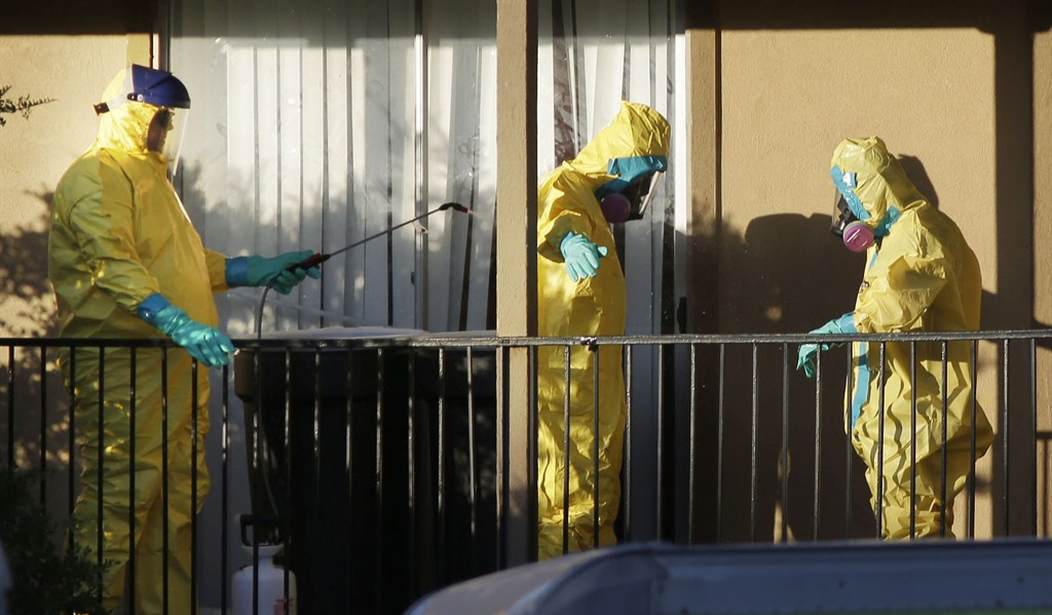Does big government necessarily and automatically imply incompetent government?
Unfortunately, that seems to be the case. Robert Samuelson, for instance, has written that the federal government is so large that it breeds failure and disappointment. I added my two cents, writing that:
…government is far more likely to have a “reverse Midas touch” when it is too big to manage.
I also posed a rhetorical question in another post from 2013.
I suppose a more interesting program would be to identify things that the government does intelligently and effectively. Any suggestions?
That wasn’t a throwaway line. There are some legitimate functions of government and I want those to be handled efficiently.
But I worry that effective government is increasingly unlikely because politicians are so busy intervening in areas that should be left to the families, civil society, and the private sector.
The response to the Ebola Virus is a sobering example.
Writing for The Federalist, David Harsanyi explains that the bureaucrats at the Centers for Disease Control are whining about not having enough money to contain and fight Ebola, yet there wouldn’t be any problem if the CDC wasn’t distracted by things that are irrelevant to its core mission.
CDC’s budget and purview have swollen over the past few decades as it has seen an infusion of funding due to temporary health scares and trendy crusades that often go well beyond any mission it should be pursuing. …the CDC needs to rethink it’s scope. The CDC can’t afford to keep a aerial ‘bio-containment unit’ on retainer, but it does have museum, a massive staff and a lots of waste and fraud. In 2007, Senator Coburn’s office authored a 115-page report detailing things like the CDC budget gimmicks, the agency’s hundreds of millions of dollars of waste on junkets and elaborate digs and its institutional failures to actual ‘control diseases’ – and this includes AIDs prevention. …The CDC, an agency whose primary mission was to prevent malaria and then other dangerous communicable diseases, is now spending a lot of time, energy and money worrying about how much salt you put on your steaks, how often you inhale second-hand smoke and how often you do calisthenics.
Recommended
To be fair, some of the blame should be shared with the politicians who divert resources away from disease fighting.
 Though keep in mind that bureaucrats and politicians generally work hand-in-hand when budgets get approved and government power gets expanded.
Though keep in mind that bureaucrats and politicians generally work hand-in-hand when budgets get approved and government power gets expanded.
With lobbyists and interests groups greasing the way, of course.
But today’s post isn’t about the corrupt machinations of Washington, so let’s get back to our main point.
Professor Glenn Reynolds of the University of Tennessee is similarly worried that mission creep undermines the government’s ability to accomplish important things.
While we’d be better off if the CDC only had one job — you know, controlling disease— the CDC has taken on all sorts of jobs unrelated to that task. …These other tasks may or may not be important, but they’re certainly a distraction from what’s supposed to be the CDC’s “one job” — protecting America from a deadly epidemic. And to the extent that the CDC’s leadership has allowed itself to be distracted, it has paid less attention to the core mission. In an era where new disease threats look to be growing, the CDC needs to drop the side jobs and focus on its real reason for existence. But, alas, the problem isn’t just the CDC. It’s everywhere. It seems that as government has gotten bigger, and accumulated more and more of its own ancillary responsibilities, it has gotten worse at its primary tasks. It can supervise snacks at elementary schools, but not defend the borders; it can tax people to subsidize others’ health-care plans but not build roads or bridges; and it can go after football team names but can’t seem to deal with the Islamic State terror group. Multitasking results in poorer performance for individuals. It also hurts the performance of government agencies, and of government itself. You have one job. Try doing it.
Amen.
For an amusing, yet insightful, look at the connection between government size and government competence, Mark Steyn nails it.
On the other hand, some columnists argue that more power for government is the way to deal with government incompetence.
Amazing.
P.S. I wrote a couple of days ago that Obama was right about the relative weakness of European economies, but then asked why on earth he wants to make America more like Europe with bigger government.
On a related note, here’s a blurb from an article in the Daily Caller.
Don’t allow big government to take over free market system, Italian journalist Matteo Borghi warns in his new e-book, “Italy, Where Dems’ Dreams Die: How Big Government Pauperized A Prosperous Country.” He outlines the “Italian situation” he says has resulted from government growth — soaring debt, high unemployment rates, burdensome tax rates and a corrupt and nearly bankrupt pension system. His goal is to convince Americans not to follow suit. “You are already better off, but if you will go on increasing big government and cracking down on entrepreneurs you could soon become like Italy,” Borghi told The Daily Caller News Foundation. “That’s why, in my book, I say: ‘You shouldn’t give up American Dream to follow Italian nightmare.’”
Or the French nightmare. Or the Greek nightmare. Or the Swedish nightmare. Or the German nightmare. I could continue, but you get the point.
P.P.S. Though there is one deluded New York Times columnist who thinks we should emulate Italy.

























Join the conversation as a VIP Member